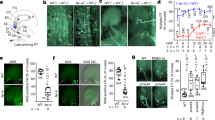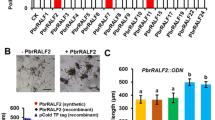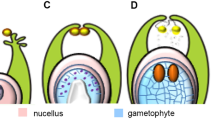Abstract
POLLEN germination involves the conversion of the quiescent vegetative cell into a metabolically active and rapidly growing pollen tube1. Although many external factors influence pollen germination, no predominant control mechanism has been identified. In certain lymphocytes in culture, lectins (plant agglutinins) have been shown to stimulate quiescent cells to enlarge and synthesise DNA2,3. Lectins also bind to the surface of actively growing cells and cause agglutination of red blood cells and transformed or malignant cells2–4, of gametes of Chlamydomonas5 and of carrot protoplasts6. There have, however, been few studies of the effects of lectins on plant tissues. The results presented here show that the lectins, concanavalin A (con A) and phytohaemagglutinin-M (PHA), stimulate pollen of Lilium longiflorum to germinate more rapidly than controls, by reducing the length of the lag period before pollen tube emergence.
This is a preview of subscription content, access via your institution
Access options
Subscribe to this journal
Receive 51 print issues and online access
$199.00 per year
only $3.90 per issue
Buy this article
- Purchase on Springer Link
- Instant access to full article PDF
Prices may be subject to local taxes which are calculated during checkout
Similar content being viewed by others
References
Dickinson, D. B., Science, 150, 1818–1819 (1965).
Sharon, N., and Lis, H., Science, 177, 949–959 (1972).
Nicolson, G., Int. Rev. Cytol., 39, 89–190 (1974).
Burger, M. M., and Noonan, K. D., Nature, 228, 512–515 (1970).
McLean, R. J., and Brown, R. M., Devl Biol., 36, 279–285 (1974).
Glimelius, K., Wallin, A., and Eriksson, T., Physiol. Pl., 31, 225–230 (1974).
Simons, D. H., Sfakiotakis, E., and Dilley, D. R., Hortscience, 7, 556–557 (1972).
Dickinson, D. B., Physiol. Pl., 20, 118–127 (1967).
Kroh, M., Labarca, C., and Loewus, F., in Pollen Development and Physiology (edit. by Heslop-Harrison, J.), 273–278 (Butterworths, London, 1971).
Weisenseel, M. H., and Jaffe, L. H., J. Cell Biol., 63, 368a (1974).
Watson, L., Knox, R. B., and Creaser, E. H., Nature, 249, 574–576 (1974).
Loor, F., Eur. J. Immun., 4, 210–220 (1974).
Mascarenhas, J. P., in Pollen Development and Physiology (edit. by Heslop-Harrison, J.), 201–222 (Butterworths, London, 1971).
Loewus, F., Chen, M.-S., and Loewus, M. W., in Biogenesis of Plant Cell Wall Polysaccharides (edit. by Loewus, F.), 1–27 (Academic, London and New York, 1973).
Author information
Authors and Affiliations
Rights and permissions
About this article
Cite this article
SOUTHWORTH, D. Lectins stimulate pollen germination. Nature 258, 600–602 (1975). https://doi.org/10.1038/258600a0
Received:
Accepted:
Published:
Issue Date:
DOI: https://doi.org/10.1038/258600a0
This article is cited by
-
Mitochondrial development and activity of binucleate and trinucleate pollen during germination in vitro
Planta (1979)
-
Struktur ? Funktion und analytischer Einsatz in biologischen Systemen
Klinische Wochenschrift (1977)
Comments
By submitting a comment you agree to abide by our Terms and Community Guidelines. If you find something abusive or that does not comply with our terms or guidelines please flag it as inappropriate.



